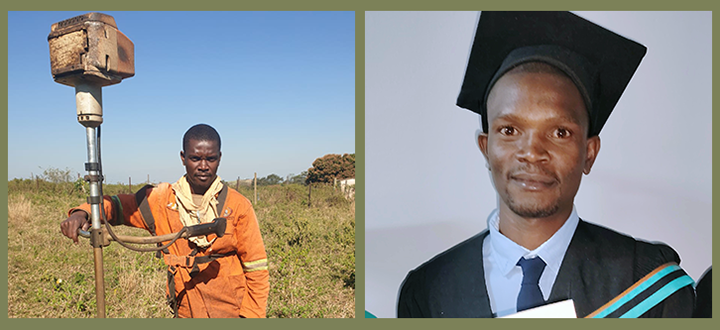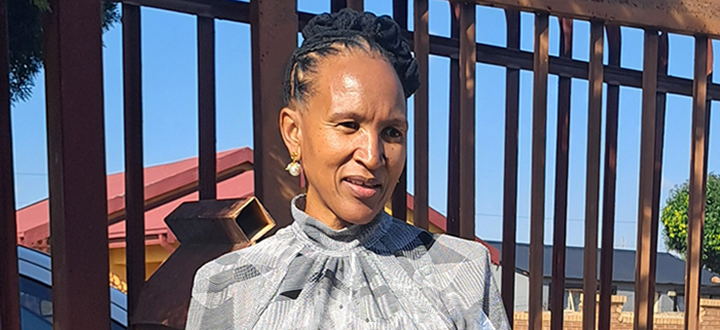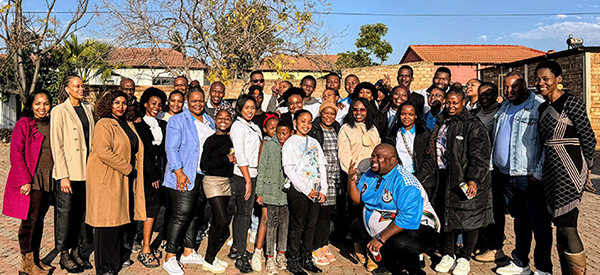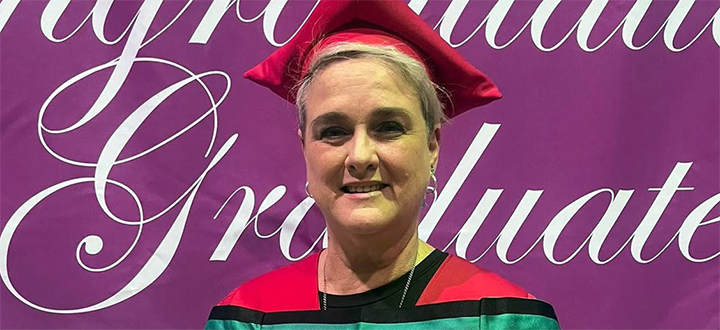College of Human Sciences
Meet the new Director for CHS School of Humanities
Professor Rothney Tshaka has been appointed to lead the College of Human Sciences’ School of Humanities. The former Chair of the Department of Philosophy, Practical and Systematic Theology in the College said he considers the appointment as a significant affirmation of his ability to lead a strategic entity. However, he acknowledged that the College has many abled men and women capable of taking the School of Humanities to greater heights.
“While I am responsible for the leadership of the School, I believe in the power of collective wisdom. It is for this reason why I value the advice of the members of my management committee. I am humbled to have been chosen to serve the college and the university in this capacity.”
Born and raised in Kimberley, Professor Tshaka did his primary and secondary schooling at the then Kgabang Combined school. Upon completion of his grade 12, he left for the University of the Western Cape to read for a Bachelors of Theology. At that time, he also got involved in student politics and was elected chairperson of the Azanian Student Convention (AZAPO) in 1998. He then moved to the University of Stellenbosch were he completed an MDiv as well as a Licentiate in Theology. His licentiate year coincided with a stint at the Columbia Theological Seminary in Decatur GA. He then completed an MA at the Free University of Amsterdam and returned to the University of Stellenbosch where he completed a PhD in Theology in 2005. He has taught Theology and Ethics at the Murray Theological College in Masvingo, Zimbabwe and was also global scholar of ethics and associate professor at the New Brunswick Theological Seminary in New Brunswick, New Jersey. In 2009, he joined Unisa.
When asked to describe himself outside of academia, this is what Professor Tshaka had to say: “Rothney is a black young man who loves life. I believe in treating people with kindness and not to look down on those less privileged than me. I am a theologian and have great regard for scholarship. I have been immersed in the black consciousness movement from an early age and so issues of black culture and the self-reliance of black people are things that excite me a great deal.”
In his new position, he said he is most excited by what seems to be awakening from a deep sleep when it comes to the question of Africanisation. “While I note that this has been a progressed exercise in other parts of the continent since the independence of Africa from its colonial masters, I believe that this is, for us in South Africa, the most opportune time not only to reflect on Africanisation, but to make Africanisation tangible so that we can touch and feel what we mean by Africanisation.”
Professor Tshaka says when I arrived at Unisa in 2009, his arrival coincided with the inauguration of the College’s Africa Speaks Lecture Series. “The speaker who gave the inaugural lecture was Professor Adebayo Olukoshi. At that time he was associated with The Council for the Development of Social Research in Africa (CODESRIA). Professor Olukoshi was giving a lecture at a time when we had seen the global economic meltdown. What stuck with me was his assertion that the humanities are the conscience of society precisely during time when there is uncritical focus on making money by all means necessary. I see the School of Humanities looking for ways of reminding society that it (humanities) is in fact the conscience of society.”
With Africanisation and decoloniality being at the forefront of the transformation agenda of the CHS curricula, Professor Tshaka believes that the School of Humanities is in a strategic position to help curve out this new pan-Africanist vision of scholarship and knowledge production in South Africa. “It is for this very reason that the CHS has thought it necessary to begin to look actively for partnerships with institutions like the College of Humanities and Social Sciences at the University of Makerere in Uganda. I am hoping that this proposed partnership with a world-renowned university in Africa could help us find ways of engaging with our Philosophy in the Park initiative as well as strengthening the Black August Festival. This in my view, would be an opportunity of giving credence to the partnership mentioned here.”
Speaking on why the CHS, and in particular, the School of Humanities, is important for the country and continent and how it can contribute in alleviating challenges we currently face, Professor Tshaka said: “I believe the humanities are significant because I regard it chiefly as the conscience of society. We live also in a time where there is considerate progress made in terms of technology. While this is vital, we must be note that we are to align with those who are left behind as society progresses. We have seen with the 2008 recession how irresponsible the belief is that the humanities should be disregarded and a culture profit be all means necessary should be the order of the day. Humanities when accepted at the conscience of society, remain today as relevant as they were during the struggles against apartheid and colonialism.”
He concluded by saying that there is an African perspective which says, “there is nothing that has been said and thought of today that our (African) ancestors have not said and thought of already”. “This for me is a fundamental belief. It serves to remind me that it is pure ignorance of everyone including Africans to suggest that simply because it was not recorded, our ancestors have not spoken. It is for this reason that I marvel in our African proverbs and sayings because they are the proof that even when said ages ago, they have been intelligent enough, that what they have said through their proverbs still resonate with our time today.”
* By Rivonia Naidu-Hoffmeester (CHS communications and marketing)
Publish date: 2018-02-27 00:00:00.0



 Cutting grass by day, pursuing Unisa studies by night
Cutting grass by day, pursuing Unisa studies by night
 Koma e wetse: When tradition meets the harsh realities of modern livelihoods
Koma e wetse: When tradition meets the harsh realities of modern livelihoods
 Imbizo inspires youth
Imbizo inspires youth
 Shedding light on the well-being of ODeL facilitators
Shedding light on the well-being of ODeL facilitators
 A giant leap for student success and retention
A giant leap for student success and retention